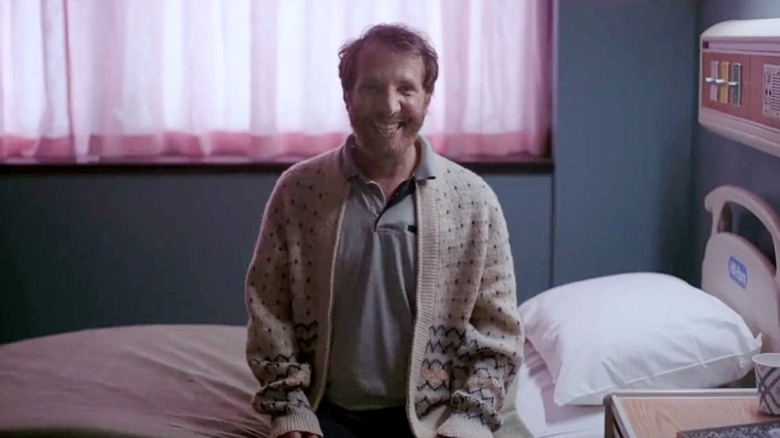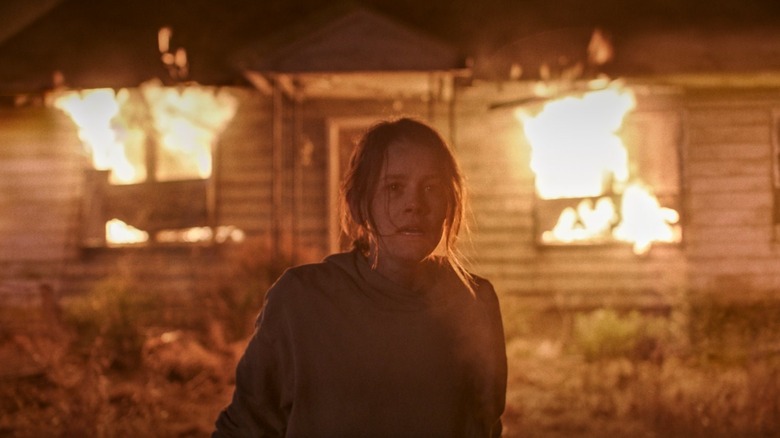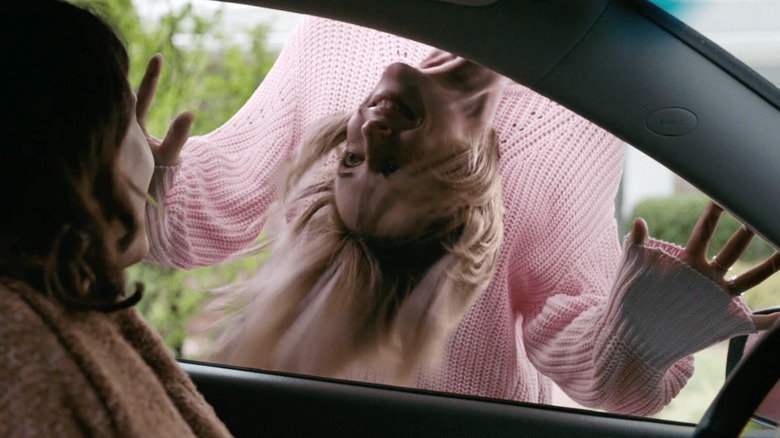Smile Director Parker Finn On Practical Scares And A Possible Sequel [Exclusive Interview]
Becoming a filmmaker is a journey with no set of rules that govern how one accomplishes arriving at that particular destination. For every success story, there will be a different journey. You could be Ridley Scott and not make your first feature (which just so happened to be "Alien") until you're 40. Maybe you're Kevin Smith getting plucked from complete obscurity with his little movie that could, "Clerks," out of Sundance in '94. Or maybe you're Parker Finn, who made a short that got turned into a big studio feature film in the form of "Smile."
By now, most horror fans have seen those trailers for "Smile," with the unsettling grins painted on people's faces which haunt Sosie Bacon's character, Rose. This is Finn's first feature film, and it's getting a wide release this week to help kick off the Halloween season in earnest. For Finn, his journey started with a short titled "Laura Hasn't Slept" which paved the way for a feature-length adaptation. Ultimately, it was Paramount Pictures that signed Finn to a deal.
Finn's movie recently debuted at Fantastic Fest, setting it up for its theatrical run where the masses will have the chance to take in its creepy delights. I had the good fortune of speaking with Finn after the premiere in anticipation of the release. We discussed his take on injecting humor into horror, what kinds of movies he might like to make in the future, and much more.
'We set out to accomplish a lot with a little'
So how are you feeling after the premiere last night? Your big movie, at Fantastic Fest. How does it feel?
Amazing. I can't think of a better audience to have debuted in front of. It just felt electric in the room. The reason I made the movie was for audiences like that.
This is your first feature. A lot of people make a small movie first. Your first feature is a big Paramount release. How does that feel?
It feels amazing. It feels surreal. I feel incredibly lucky and humble that I had this opportunity. I love that you said it feels like a big, giant movie, because it certainly was not in the making of it. But we set out to accomplish a lot with a little.
You talked a little bit at the Q&A last night about how you had the short, and some studios were meeting with you on it. But what did Paramount do, or how did they come in and become the ones to take the movie over other suitors that might have been there?
Yeah, really, I mean it was Paramount and then my producers at Temple Hill kind of in tandem. But really it was about, they loved the idea and they wanted to get behind it. We had this weird left of center thing we were trying to do, and I wasn't sure if a studio was going to go for it or not. To their credit, they really got behind it in a big way. For me, it was about if I was going to enter the machinery of a studio. I didn't want to get gobbled up by it. I wanted to be able to still do that thing we set out to do, that north star, and yeah, I'm very pleased with that.
You mentioned the left of center idea, and I think when you get into it, it very much is that, but maybe the hook of it is, it's kind of like "The Ring" or "Final Destination," but with smiling. How do you arrive at that idea in the first place?
I think I was really interested in the stuff that we all carry around inside of us, that we're all sort of internally haunted by our traumas, our past, all the things that have happened to us that make us who we are. I wanted to take something sort of external and supernatural, and see if I could weave those two things together and make them indistinguishable with one another.
One of the other things — and I think this is super important with a movie like this — is there's levity.
Yes.
There is a ridiculous amount of tension and you never know when it's going to release. But thank God there's some moments of levity in there. Even in the theater, I remember when they just revealed the cast's name, everyone was like, "That's great." I feel like scares have to be intentional, but is the humor always intentional? Or do you find that there are moments where you didn't anticipate for there to be humor and then it sort of emerges?
I think it's really important, like you said, to have a little bit of release for the audience, especially with something that is so sort of tension- and anxiety-fueled as this. Those moments, if I can get people to laugh unexpectedly, or get them so nervous that they feel they need to laugh because they don't know what else to do with their body. I love that feeling as an audience member and that's what I was hoping to do to an audience.
The best way I could describe it to my girlfriend was like, "It's one of those watch through your fingers movies." You know something bad's about to happen, so you kind of just [puts hands in front of face]. The other thing you mentioned at the screening last night, which I thought was interesting, is you said that you hate CGI and you went very hard for ... I don't want to spoil anything for anybody, but there's some practical effects stuff in this movie.
Oh yeah.
Why was that so important to you to have that be the way that you approach some of the things in this movie?
Yeah, I grew up on practical effects. It was one of the reasons I wanted to become a filmmaker, because I was so fascinated with them. I just think that when something is real and there, and the actors can interact with it, it just gives it a different kind of gravity. Unless you've got these giant Marvel budgets ... it's not that I hate CG. I think the effects are a tool that can be wielded either really well or very clumsily. In this case, if you're going to do something big and bombastic, and there's the opportunity to do it practical, I'm always going to lean into practical because that's what I love and I think it's more effective.
'I never want to just do a retread of anything'
You did the good thing that most horror filmmakers do because they know the nature of the beast: You laid in all of this mythology that we only touch on a little bit. With the state of horror being as it is, you're with Paramount. If this does well, they're probably going to want a sequel. Have you put any thought into — let's say it does well enough and you get to do a second one? Or are you just like, "This is a one and done thing?"
I'm just trying to enjoy the moment of finally crossing the finish line on this one. I think there's a lot of fun to be had in the world of "Smile," but as a filmmaker, I never want to just do a retread of anything. So, if there was ever to be more, I'd want to make sure that it was very surprising and not what people might expect.
This is not a super serious question, but it is something I considered. For me, watching the movie last night, I thought it was very scary. There are just moments where she's in the house, and she's got all the lights off. Other than the fact that it's better for horror, do other people just sit in their house with the lights off all the time? Or am I weird for having lights on?
No, yeah, I mean what was really important is that I wanted to not make any of the environments or anything feel like a trope-y horror place. I wanted to avoid anything gothic or anything like that. But I wanted to create these sort of architectural spaces that, through how we're lighting them and through the context and what the character's feeling, become incredibly uninviting. That was kind of the goal. I love hearing that it clearly had an effect on you.
This is your first feature, and a lot of times it's easy to, as an artist, be put in a box by a system. You're a horror movie guy now, this is what you do. Do you want to stick in genre filmmaking, or do you have other ambitions that extend beyond that?
I mean, I think I'm a huge genre fan. Horror is one of my first loves. For me, I love anxiety fuel and just sort of nervous, stressful kinds of movies. Things that get a visceral reaction out of you. I think I can't help it as a storyteller: I always lean into something that just is going to mess with you and be a little provocative and a little bit transgressive. Whether it's something that's horror or adjacent, there'll always be some sort of uncomfortable element, I think, to the films that I want to make.
This is a pretty jump-scary movie. But you mess with the form a bit where you think the tension's going to release somewhere and it doesn't. How do you balance the amount of jump scare you'll throw into a movie like this?
I think you kind of just got to go with your gut. I'm somebody who never wants to use cheap jump scares, so I hope that the jumps in the movie [are not cheap].
They were not.
For me, it's a balance of that. But also to have that just ratcheting up the anxiety, the dread, the tension. That, I think paired with some of these jumps, together creates this really potent brew. It was all about just feeling it going through. A lot of filmmaking is that.
The other thing is this year, we've got "Halloween Ends" coming out in the middle of October. But the way I see it, the way the slate is sort of working out, you're kind of one of the big Halloween season releases. So, not only is your movie Paramount Pictures big, but you're maybe the Halloween season go-to movie that isn't a franchise. How does that feel?
I mean, it feels amazing. The journey for this movie has been just totally surreal to have gotten this opportunity to come out going into October. We also shot the movie in the fall. So, I love that we're coming out in the fall. It just feels kind of like kismet. I hope that audiences that are looking for something scary, but also a great character story, go out and see it and love it.
"Smile" hits theaters on September 30, 2022.


